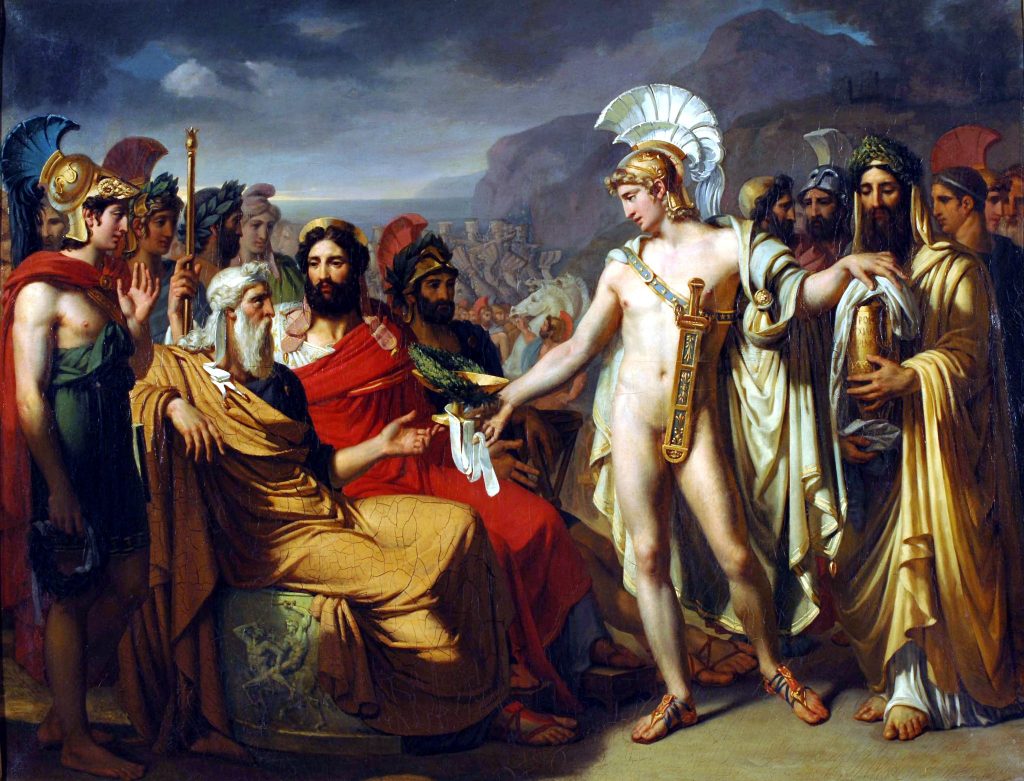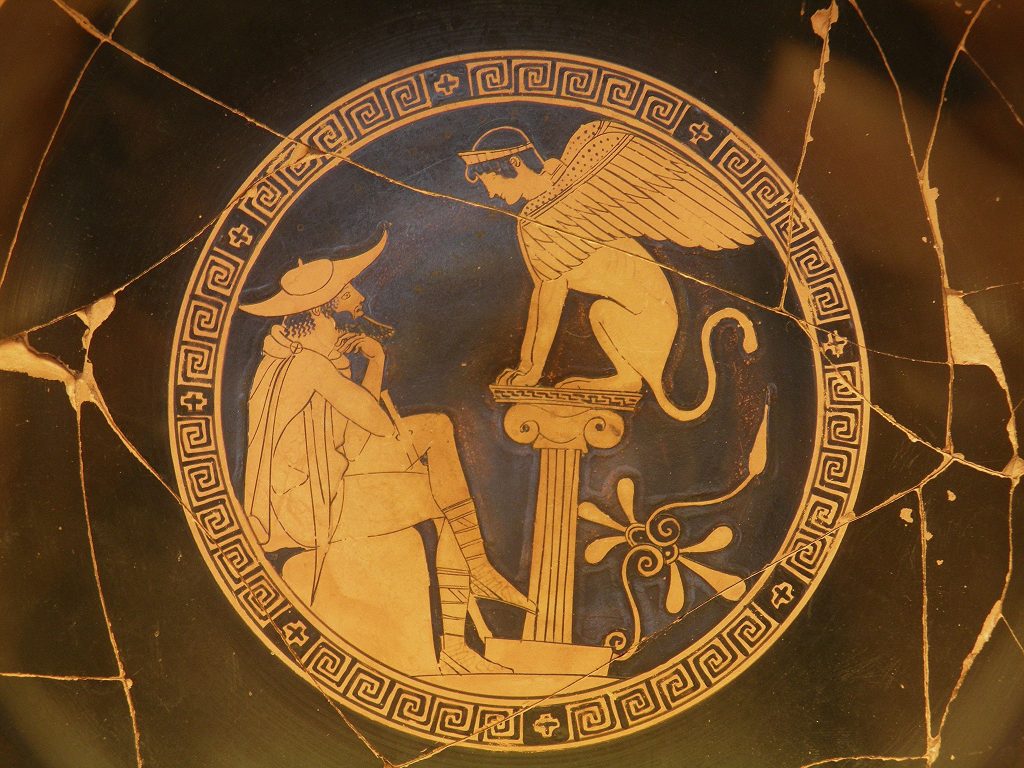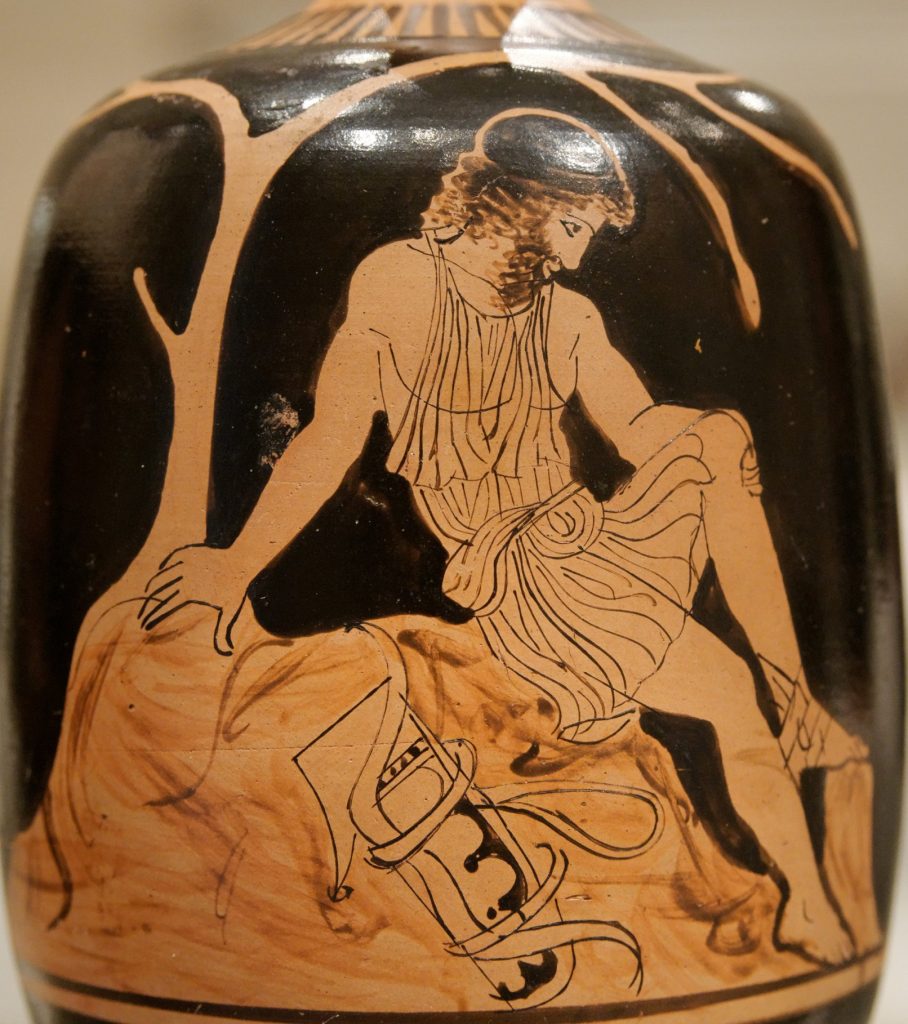This time our Core Vocab exploration, taken from terms listed in H24H[1] and tracked in the associated Sourcebook[2], is about ainos [αἶνος] ‘authoritative utterance for and by a social group; praise; fable’; and the related word ainigma [αἴνιγμα] ‘riddle’. In H24H 2§60, Gregory Nagy says:
Here is my working definition of this word: an ainos is a performance of ambivalent wording that becomes clarified once it is correctly understood and then applied in moments of making moral decisions affecting those who are near and dear.
and he goes on to explain in 2§72:
Unlike epic, the ainos requires three qualifications of its listeners in order to be understood:
- The listeners must be sophoi, ‘skilled’, in understanding the message encoded in the poetry. That is, they must be mentally qualified.
- They must be agathoi, ‘noble’. That is, they must be morally qualified.
- They must be philoi, ‘near and dear’, to each other and to the one who is telling them the ainos. That is, they must be emotionally qualified. Communication is achieved through a special sense of community, that is, through recognizing “the ties that bind.”
Here is an initial example, starting at the end of Nestor’s graceful acceptance speech when Achilles awards him an honorary ‘lifetime achievement’ award of a two-handled urn that had not been awarded in the chariot race.
“…[645] I must bow before the weight of years, but in those days I was eminent among heroes. And now, sir, go on with the funeral contests [athloi] in honor of your comrade: gladly do I accept this urn, and my heart rejoices that you do not forget me but are ever mindful of my gentleness towards you, and of the respect [timē] due to me from the Achaeans. [650] For all which may the grace [kharis] of heaven be granted you in great abundance.”
Then the son of Peleus, when he had listened to all the praise [ainos] of Nestor, went about among the concourse of the Achaeans …
Iliad 23.645–653, Sourcebook
Although it is translated here as “praise,” we know that the bulk of the speech had been about Nestor’s youthful accomplishments (including the time when he was defeated in a chariot race by twins who outmaneuvered him in a similar fashion to how Antilokhos overtook Menelaos), so there may be additional meanings of ainos at work here.
I wonder if Eumaios saw through one of Odysseus’ cunning lies: as the “beggar” Odysseus has been testing the swineherd to see if he will offer him a cloak; he tells a story about how “he-the-beggar” saw the “real Odysseus” trick somebody out of a cloak back in the Trojan War.
And Eumaios answered, “Old man, you have told us an excellent riddling speech [ainos], and have said nothing so far but what is quite satisfactory; [510] for the present, therefore, you shall want neither clothing nor anything else that a stranger in distress may reasonably expect, but tomorrow morning you have to shake your own old rags about your body again, for we have not many spare cloaks nor khitons up here, but every man has only one. [515] When Odysseus’ son comes home again he will give you both cloak and khiton, and send you wherever you may want to go.”
With this he got up and made a bed for Odysseus by throwing some goatskins and sheepskins on the ground in front of the fire.
[520] Here Odysseus lay down, and Eumaios covered him over with a great heavy cloak that he kept for a change in case of extraordinarily bad weather.
Odyssey 14.507–522, Sourcebook
To what extent does Eumaios possess the qualifications described by Gregory Nagy (sophos, agathos, philos)? Athena says to Odysseus, “he has been always well affected towards you, and is devoted [philein] to circumspect Penelope and your son” (13.405–6). He is described as “a man of good principles” (phrenes … agathoi, 14.420), and executes the proper formalities for hospitality and for sharing the meal: “a most equitable man” (phrenes … aisima, 14.434.) What about being sophos?
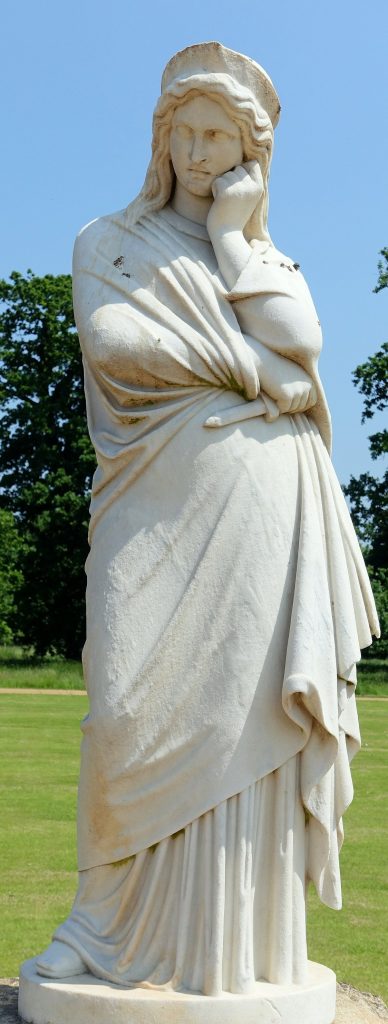 The sense of praise comes again in the Agamemnon of Aeschylus. Clytemnestra has invited her husband to step out of the chariot onto the costly purple tapestry, and lavished greetings and salutations on him:
The sense of praise comes again in the Agamemnon of Aeschylus. Clytemnestra has invited her husband to step out of the chariot onto the costly purple tapestry, and lavished greetings and salutations on him:
Clytemnestra
….910 Quick! With purple let his path be strewn, that dikē may usher him into a home he never hoped to see. The rest my unslumbering vigilance shall order duly—if it please the god—even as is ordained.Agamemnon
Offspring of Leda, guardian of my house, 915 your ainos fits well with my absence; for you have drawn it out to ample length. But becoming praise—this prize should rightly proceed from other lips. For the rest, treat me not as if I were a woman, in a luxuriant [habros] manner, nor, like some barbarian, 920 grovel before me with widemouthed acclaim; and do not draw down envy upon my path by strewing it with tapestries. It is the gods we must honor thus; but it is not possible for a mortal to tread upon embroidered fineries without fear. 925 I tell you to revere me not as a god, but as a man.Aeschylus Agamemnon 914–925, Sourcebook
Does it mean simply “praise”? Perhaps Agamemnon himself thinks it does, although perhaps we could also read his speech in a way that admits of his having some doubts about what she is doing. However, for the audience, that double meaning of a “fable” and the relationship to the ainigma might have been at the back of their minds.
The word ainigma itself is used by the Chorus in response to Kassandra’s prophecy about the fate of Agamemnon that is being played out off-stage:
Kassandra
… Ah, damned woman, will you do this thing? Your husband, the partner of your bed, when you have cheered him with the bath, will you—how shall I tell the end [telos]? 1110 Soon it will be done. Now this hand, now that, she stretches forth!Chorus
Not yet do I comprehend; for now, after riddles [ainigma pl.], I am bewildered by dark oracles.Aeschylus Agammenon 1107–1114, Sourcebook
Perhaps the most famous riddle is that of the Sphinx. Here is one account of it, picking up after Laios’ death:
Creon, son of Menoeceus, succeeded to the kingdom. In his reign a heavy calamity befell Thebes. For Hera sent the Sphinx, whose mother was Echidna and her father Typhon; and she had the face of a woman, the breast and feet and tail of a lion, and the wings of a bird. And having learned a riddle [ainigma] from the Muses, she sat on Mount Phikion, and propounded it to the Thebans. And the riddle was this:— What is that which has one voice and yet becomes four-footed and two-footed and three-footed? Now the Thebans were in possession of an oracle which declared that they should be rid of the Sphinx whenever they had read her riddle [ainigma]; so they often met and discussed the answer, and when they could not find it the Sphinx used to snatch away one of them and gobble him up. When many had perished, and last of all Creon’s son Haemon, Creon made proclamation that to him who should read the riddle [ainigma] he would give both the kingdom and the wife of Laios. On hearing that, Oedipus found the solution, declaring that the riddle [ainigma] of the Sphinx referred to man; for as a babe he is four-footed, going on four limbs, as an adult he is two-footed, and as an old man he gets besides a third support in a staff. So the Sphinx threw herself from the citadel, and Oedipus both succeeded to the kingdom and unwittingly married his mother, and begat sons by her, Polyneikes and Eteokles, and daughters, Ismene and Antigone.
Apollodorus Library 3.5.8, adapted from translation by Sir James George Frazer[3]
In his discussion of rhetoric, Aristotle talks about how to make an effective metaphor, with reference to another ainigma:
Further, metaphors must not be far-fetched, but we must give names to things that have none by deriving the metaphor from what is akin and of the same kind, so that, as soon as it is uttered, it is clearly seen to be akin, as in the famous enigma [ainigma], “ I saw a man who glued bronze with fire upon another.” There was no name for what took place, but as in both cases there is a kind of application, he called the application of the cupping-glass gluing. And, generally speaking, clever enigmas [ainigma, plural] furnish good metaphors; for metaphor is a kind of enigma [= spoken as an ainos], so that it is clear that the transference is clever.
Aristotle Rhetoric 3.2, adapted from translation by J.H. Freese[4]
And in this passage we hear about the difference between a riddle and an allegory:
“π. αἰνίγματος: διαφέρει δὲ ἀλληγορίας ὅτι ἡ μὲν ἀμαυροῦται ἢ λέξει ἢ διανοίᾳ, τὸ δὲ καθ᾽ ἑκάτερον, οἷον:
ἥσσων ἀλγήσας παῖδα τὸν ἐκ Θέτιδος:
CURFRAG.adespota-002.28
ἥσσων γὰρ ὁ χείρων, ἀλγήσας πονήσας: ἔστι δὲ ὅτι Χείρων ὁ Κένταυρος ἐξέθρεψε τὸν Ἀχιλλέα: καὶ πάλιν:γῆς ἔθανεν καταδέσμου ὅτ᾽ ἀγγείων ἀφάμαρτεν:
CURFRAG.adespota-002.29
ἀντὶ τοῦ Αἴας ὁ Τελαμῶνος ἐτελεύτησεν ὅτε τῶν ὅπλων ἀπέτυχε γῆς γὰρ αἴας γίνεται, καταδέσμου τελαμῶνος, ἀγγείων δὲ τῶν ὅπλων.”Trypho π. τρόπων Rh. Gr. 8. 733W
“The riddle [ainigma] differs from allegory in this, that allegory is obscure either in style or in meaning, and it [= the riddle] in both, for instance:
Less having suffered the son of Thetis;
CURFRAG.adespota-002.28
For less is ‘worse’ and worse is ‘cheiron,’ and suffered is ‘made,’ and it means that Cheiron the centaur brought up Achilles. And again:Died of earth of belt when he lost pots;
CURFRAG.adespota-002.29
meaning Aias(also = of earth)son of Telamon(also = of belt)died when he lost his arms also = pots.”Tryphon On Tropes [the riddle]
Adapted from Elegy and Iambus, Volume II, 2.26.2 translated by J.M. Edmonds[5]
These riddles incorporate wordplay and puns.
But what of ainos as an authoritative utterance? One example might be in the following passage, from Sophocles Philoctetes. Neoptolemus and Odysseus have come to retrieve the bow of Heracles which is now in the hands of Philoctetes who is in exile: after Neoptolemus has tricked Philoctetes into handing over his bow, he has now tried to persuade him to return to Troy himself, and has told Philoctetes that returning to Troy will enable him finally to be free of the pain and sickness of his poisoned foot. Philoctetes cries out:
ὦ δεινὸν αἶνον αἰνέσας, τί φής ποτε;
You who have uttered [aineîn] frightening advice [ainos], what have you said?Sophocles Philoctetes 1380, adapted from translation by Sir Richard Jebb[6]
Jebb, in his notes to the translation, says “Though one sense of “αἶνος” was a story with a moral (Hes. Op. 200), it could hardly have been used as it is here, in the sense of ‘advice,’ unless the meaning had been helped out by the cognate verb.”
The verb here, aineîn [αἰνεῖν], according to LSJ, can mean “tell or speak of; praise; approve, advise, recommend; acquiesce; promise”[7]
But the play is filled with layers of meaning and ambiguity. And here the ainos is described as deinos, itself a word that can mean “terrible, terrifying” and/or “awe-inspiring” so this line seems to signal that here, as the drama is coming to its close, there is a turning point. Philoctetes indeed accompanies Neoptolemus and leaves the island.
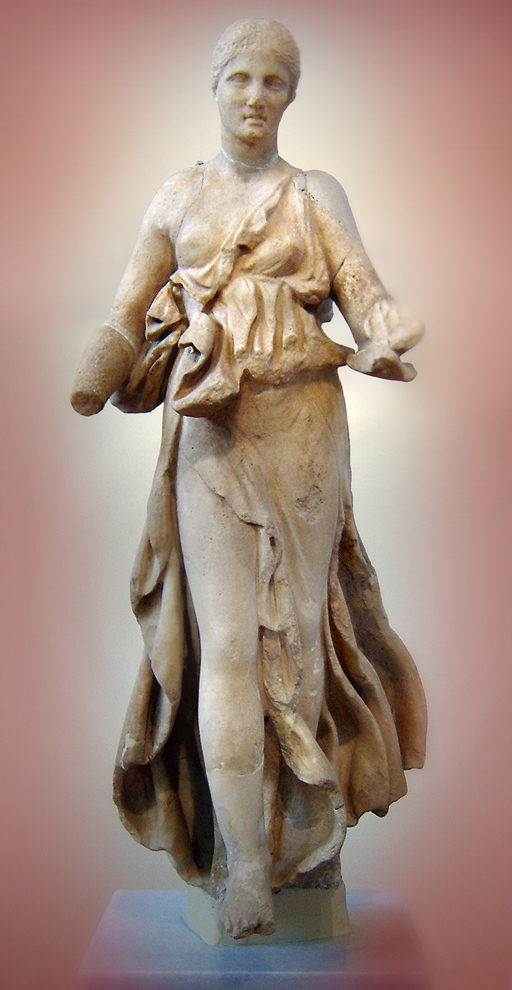 In Pindar, the word ainos is used to mean “praise,” which fits the purpose of his poems as celebrating athletic victors, as here in the short poem Olympian 11, which I quote in full:
In Pindar, the word ainos is used to mean “praise,” which fits the purpose of his poems as celebrating athletic victors, as here in the short poem Olympian 11, which I quote in full:
There is a time when men’s need for winds is the greatest, and a time for waters from the sky, the rainy offspring of clouds. But when anyone is victorious through his toil [ponos], then honey-voiced odes [5] become the foundation for future fame, and a faithful pledge for great deeds of excellence [aretē, plural]. This praise [ainos] is dedicated to Olympian victors, without stint. My tongue wants to foster such themes; [10] but it is by the gift of a god that a man flourishes with a skillful [sophos] mind, as with anything else. For the present rest assured, Hagesidamos son of Arkhestratos: for the sake of your boxing victory, I shall loudly sing a sweet song, an adornment [kosmos] for your garland of golden olive, [15] while I honor the race of the Western Locrians. There, Muses, join in the victory-song; I shall pledge my word to you that we will find there a race that does not repel the stranger, or is inexperienced in fine deeds, but one that is high in wisdom [highly sophos] and warlike too. For [20] neither the fiery fox nor loud-roaring lions change their nature.
Pindar Olympian 11, adapted from translation by Diane Arnson Svarlien[8]
Gregory Nagy (H24H 2§72, quoted above, and 2§75) makes the point that Pindar’s poetry incorporates all the meanings of the word ainos. This point is made more fully in Pindar’s Homer[9]
By way of its self-definition, the ainos is predicated on an ideal: an ideal audience listening to an ideal performance of an ideal composition. But at the same time it is also predicated on the reality of uncertainties in interaction between performer and audience in the context of the actual performance of a composition: the ainos of Pindar is by its very character ambiguous, both difficult in its form and enigmatic in its content
Gregory Nagy Pindar’s Homer, 6§5
So taking the example of Olympian 11, on the surface this is a song of praise, and that is usually how the word ainos is translated. But the poem as a whole, including as it does an invocation of the Muses, can be taken as an “authoritative utterance.” Many of Pindar’s poems also incorporate a myth, which has some relevance to the victor and/or his family or to other themes within the poem; and (as with many others) there are gnomic utterances at the start and end of this poem, so we can see how in Pindar the ainos is not only the praise of the victor, Hagesidamos in this case, but also incorporates references that might have been understood by those of his audience who were in the know.
I invite members to join me in the Forum for further discussion of the words ainos and ainigma to see where else they are used, and whether in the sense of “praise,” or “authoritative utterance,” or “fable,” or maybe a mixture of all three.
In H24H Gregory Nagy describes the narrative of Phoenix as an ainos but although there is other wording to indicate this special type of speech act, the term ainos itself does not actually appear in the text. So can you find examples of any speech or utterance that might be considered as an ainos even if it is not described that way in the text itself?
Notes
[1] H24H: Nagy, Gregory. 2013. The Ancient Greek Hero in 24 Hours. Harvard University Press, Cambridge, MA: 2013. Available online at CHS.
https://nrs.harvard.edu/urn-3:hul.ebook:CHS_NagyG.The_Ancient_Greek_Hero_in_24_Hours.2013
[2] Sourcebook: The Ancient Greek Hero in 24 Hours Sourcebook of Original Greek Texts Translated into English, Gregory Nagy, General Editor. 2018.12.12. Available online on the Kosmos Society Text Library and at CHS.
https://nrs.harvard.edu/urn-3:hul.ebook:CHS_NagyG_ed.Sourcebook_H24H.2013-
[3] Greek text and English translation: Apollodorus. Apollodorus, The Library, with an English Translation by Sir James George Frazer, F.B.A., F.R.S. in 2 Volumes. 1921. Cambridge, MA, Harvard University Press; London, William Heinemann Ltd.
Online at Perseus
[4] Greek text: Ars Rhetorica. Aristotle. W. D. Ross. 1959. Oxford. Clarendon Press. on Perseus
Online at Perseus
English translation: Aristotle in 23 Volumes, Vol. 22, translated by J. H. Freese. 1926. Aristotle. Cambridge MA, Harvard University Press; and London, William Heinemann Ltd. on Perseus
Online at Perseus
[5] Greek text and English translation: Elegy and Iambus. with an English Translation by. J. M. Edmonds. Cambridge, MA. Harvard University Press. London. William Heinemann Ltd. 1931. 2.
Online at Perseus
[6] Greek text: Sophocles. Vol 2: Ajax. Electra. Trachiniae. Philoctetes With an English translation by F. Storr. The Loeb classical library, 21. Francis Storr. 1913. London; New York. William Heinemann Ltd.; The Macmillan Company.
Online at Perseus
English translation: Sophocles. The Philoctetes of Sophocles. Edited with introduction and notes by Sir Richard Jebb. Sir Richard Jebb. 1898. Cambridge. Cambridge University Press.
Online at Perseus
[7] LSJ: Henry George Liddell. Robert Scott. 1940. A Greek-English Lexicon. revised and augmented throughout by. Sir Henry Stuart Jones. with the assistance of. Roderick McKenzie. Oxford. Clarendon Press.
Online at Perseus
[8] Greek text: Pindar. The Odes of Pindar including the Principal Fragments with an Introduction and an English Translation by Sir John Sandys, Litt.D., FBA. 1937. Cambridge, MA., Harvard University Press; London, William Heinemann Ltd. On Perseus:
Online at Perseus
English translation: Diane Arnson Svarlien. 1990. Odes. Pindar. On Perseus:
Online at Perseus
[9] Nagy, Gregory. 1990a. Pindar’s Homer: The Lyric Possession of an Epic Past. Baltimore, online at CHS
https://nrs.harvard.edu/urn-3:hul.ebook:CHS_Nagy.Pindars_Homer.1990
Online texts accessed February 2019. (CHS links updated March 2021).
Image credits
Joseph-Désiré Court: Achille donne à Nestor le prix aux jeux, 1820, public domain, via Wikimedia Commons
Clytemnestra, statue at Wrest Park, Bedfordshire, early–mid 19th century, Daderot (photo), public domain via Wikimedia Commons
Oedipus painter (attrib.) Oedipus and the Sphinx of Thebes Carole Raddato (photo), Creative Commons CC BY-SA 2.0, via Wikimedia Commons
Philoktetes on Lemnos, Attic red-figure squat lekythos, circa 420 BCE, Metropolitan Museum of Art. Marie-Lan Nguyen (photo), Creative Commons CC BY 2.5 via Wikimedia Commons
Statuette of Nike, Epidauros. Late 4th century BCE. Tetraktys (photo) Creative Commons CC BY-SA 3.0 via Wikimedia Commons
Note: Images have been selected from pictures that are freely available with open source or Creative Commons licenses or from photographs sent in by community members for the purpose. The images in this post are intended to suggest the subject, rather than illustrate exactly—as such, they may be from other periods, subjects, or cultures. Attributions are based where possible by those shown by museums, or on Wikimedia Commons, at the time of publication on this website.
Images accessed February 2019.
____
Sarah Scott has a degree in Language from the University of York where she specialized in philology, and has worked as an editor, technical author, and documentation manager. She is the Executive Producer for the HeroesX project, and one of the Executive Editors of the HeroesX Sourcebook. She is an active participant and member of the editorial team in Kosmos Society, with a particular interest in content development, document management, word studies, language learning, comparative linguistics, and digital humanities.
